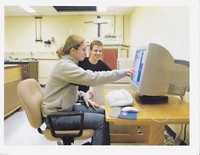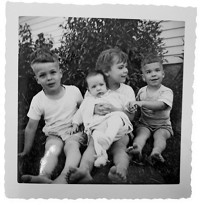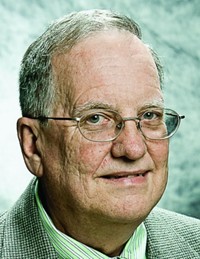Advertisement
Grab your lab coat. Let's get started
Welcome!
Welcome!
Create an account below to get 6 C&EN articles per month, receive newsletters and more - all free.
It seems this is your first time logging in online. Please enter the following information to continue.
As an ACS member you automatically get access to this site. All we need is few more details to create your reading experience.
Not you? Sign in with a different account.
Not you? Sign in with a different account.
ERROR 1
ERROR 1
ERROR 2
ERROR 2
ERROR 2
ERROR 2
ERROR 2
Password and Confirm password must match.
If you have an ACS member number, please enter it here so we can link this account to your membership. (optional)
ERROR 2
ACS values your privacy. By submitting your information, you are gaining access to C&EN and subscribing to our weekly newsletter. We use the information you provide to make your reading experience better, and we will never sell your data to third party members.
Education
Leaving The Nest
Former homeschool students reflect on their educational experiences
by Linda Wang
April 16, 2007
| A version of this story appeared in
Volume 85, Issue 16

Seth Anthony grew up in rural North Carolina, where the nearest public school was an hour's drive away. So his mother, who had worked as a teacher, decided to homeschool him. When Anthony reached high school age, his mother began taking a chemistry course at North Carolina State University as a prerequisite for entering pharmacy school. His mom would bring home her assignments, and they would do the chemistry problems together. "Homeschoolers have a tendency to turn all sorts of situations into learning situations," Anthony says.
For the chemistry labs, Anthony came up with a lot of his own experiments, many based on simple household chemistry. "When you're doing household labs, you don't go to the store and buy glacial acetic acid; you use the vinegar you have in your kitchen cabinet," Anthony says, adding that through his experience he gained a greater appreciation for how chemistry fits in with the real world.
In contrast, he remembers being frustrated with the general chemistry labs when he entered college. "It was very cookbook," he says. "Everyone was attuned to the procedural way of doing things. I was thinking in a different mind-set.
"Honestly, I can't say I learned a whole lot about chemistry from the labs," says Anthony, who is now a Ph.D. candidate in chemistry at Colorado State University.
In his thesis work, Anthony is focusing on chemistry education with the hope of someday developing more effective chemistry labs that allow students to see how chemistry fits into the big picture.
Elizabeth Paladin, another homeschool alumnus, used to get together twice a week with 11 other homeschool students who lived nearby to go over chemistry problems and do lab experiments. "It's easy to become distracted when you're spending all your time at home," she says. "The group helped motivate me." Her study group used Apologia Educational Ministries' high school science curriculum, which came with a lab kit. She remembers setting up lab stations all around her home and putting down tarps to protect surfaces. The students were careful about safety, wearing gloves and eye protection and opening windows to let in fresh air. Paladin is now a sophomore majoring in chemistry at Indiana University of Pennsylvania. She has maintained a 4.0 grade-point average.
Noah E. Robinson grew up with five siblings, and all of them were homeschooled. Their mother died when they were young, and their father, Arthur B. Robinson, not wanting to send the kids to school, decided to try homeschooling on his own. He had no idea how to teach the children, however, so he gave them some books and let them teach themselves.
There was no one to turn to for help, Noah recalls. So if there was a problem he couldn't solve, he had to keep working at it until he figured it out. As a consequence, he became extremely skilled at problem solving. Arthur jokes that his six children have better problem-solving abilities than he does. All of the children have gone into science; Noah recently received a Ph.D. in chemistry from California Institute of Technology and is now working as a research professor at the Oregon Institute of Science & Medicine, which his father founded. The self-teaching model has laid the foundation for the Robinson Curriculum, which the family sells on the side.
Homeschool graduate Richard Baumer grew up on a 280-acre farm in Missouri. There were two public schools nearby, but Baumer's parents believed they could give Richard and his two younger sisters a better education at home. Baumer remembers getting up at the crack of dawn to start his farm chores, such as caring for sheep and feeding cows. After he finished, he would begin his studies and work through the afternoon. He used a combination of curricula, including those from A Beka Book, Bob Jones University, and Apologia Educational Ministries, because he says each curriculum has its strengths. Outside of the home, he and his sisters were active in their local 4-H club. Baumer is now a junior majoring in materials joining engineering at LeTourneau University, a Christian school based in Longview, Texas, and has made straight A's in his chemistry courses.
Haley Hagg Lobland finished her entire A Beka Book K-12 homeschool curriculum by 10th grade. She completed a video course in chemistry her freshman year but did almost no hands-on labs.
To get more lab experience before entering college, she enrolled in the Texas Academy of Mathematics & Science. This school for accelerated high school students is part of the University of North Texas, where she took classes and conducted research in materials science. She says she did the chemistry labs extremely well despite not having prior experience with handling equipment and chemicals. She also excelled at the research she did, so much so that she received a Barry M. Goldwater Scholarship for her work.
Lobland went on to receive a B.S. in chemistry from Texas A&M University and an M.S. in biomedical science from Mayo Graduate School. She is now pursuing a Ph.D. in materials science and engineering at the University of North Texas. She has had a 4.0 grade-point average throughout her academic experience.
Lobland, who recently gave birth to a daughter, says she and her husband plan to homeschool their own children someday. "We're hoping to continue the tradition of homeschoolers who demonstrate that chemistry can be successfully taught, and learned, in the homeschool setting," she says.
- Science Of Homeschooling
- As homeschooling catches on, demand grows for a broader spectrum of chemistry curricula.
- Leaving The Nest
- Former homeschool students reflect on their educational experiences.
- International Relations
- Pointers help international faculty bridge cultural divide separating them and American students.
- Help For Homeschoolers
- Opportunities abound for learning science outside the home.
- The HomeSchool Diner
- Additional, external, homeschool information.





Join the conversation
Contact the reporter
Submit a Letter to the Editor for publication
Engage with us on Twitter